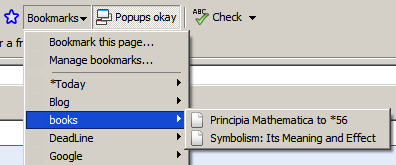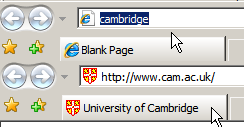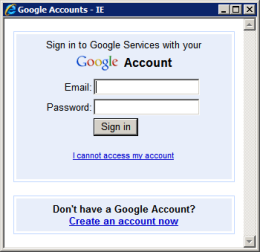Bookmarks - if you store your bookmarks online, they're fully searchable and available from any computer connected to the Internet. That's the idea behind Google Bookmarks.

History - your browser keeps the pages you visit for a small number of days and you can only search their titles. Google Web History stores all your Google searches and all the pages you visit from any computer. You get personalized search results, recommendations and a searchable database of your online activity.
Address bar - you no longer have to remember URLs. Browse by Name lets you enter the name of a company, an organization, a product or a service and go straight to its homepage. If the query is not navigational (there's no perfect answer), Google will send you to the search results page. Some people say this is an even better idea than AOL keywords.

Cookies, passwords - in addition to sessions, bookmarks and local history. This isn't yet a Google Toolbar feature, but Google Browser Sync could be integrated in the next versions. Google Browser Sync is a Firefox extension that synchronizes your browser settings across your computers and makes the transition between two computers seamless.
Opening files - if you have Microsoft Office, Adobe Reader, you can read documents from your browser. Google Toolbar for Firefox has a feature that lets you open documents and spreadsheets in Google Docs.

Any browser could be a Google Browser if you would just log in to your Google Account and all your settings would follow you: your bookmarks, the most recent visited pages, the passwords for all the other accounts, your plug-ins and their settings. And as more and more web applications become decent replacements for software, Google Browser slowly morphs into a web desktop - let's call it Google Operating System.

Google's use of install-required toolbars to accomplish web tasks seems backwards to me. With so many Google web apps, requiring a user to download a file and either install it to their computer or to their browser does not seem like a very web 2.0 solution. I would like to see a web-based Google toolbar that stores all the same data as the current toolbar and browser sync -- but can be accessed from any computer. With so many users that access multiple computers (for which they do not have install and other priveleges) in the course of a given week -- it would be a huge convenience to make it web-based. It could be built on the same browser-within-a-browser framework as Palary or Snoopy -- with the added Google functionality. Am I the only one looking for such a thing?
ReplyDeleteWhile yes I do have the Google Toolbar installed on Firefox on my linux laptop, and I have it installed on Firefox on my windows laptop at work. However I find that most of the features I use with Google is on my iGoogle page. Bookmarks, Email, Groups, Feeds, Calendar. I log into a iGoogle page anywhere and there is all my stuff. So while the toolbar is handy I rely more on my iGoogle page then the toolbar.
ReplyDeleteJesse
No you are not. This is exactly what I think too. They should do it similar to how they implemented the web-based Google Notebooks popup on the Google Search Results page.
ReplyDeleteOne of the problems with Google's otherwise fine offerings is the impossibility of getting technical support. Google Bookmarks, for example, has a bug causing excessive CPU usage on some machines. But unlike most Firefox tools, reporting a bug to Google is like publishing a book of poetry. Silence is your only reward.
ReplyDeleteWoW! So beautiful! You can post more details about the Google Bookmarks bug here and I'll see what I can do to send it to Google. Usually a good blog post is the best way to get support from Google.
ReplyDeleteThere are several reasons why Google might not want to build their own browser but I think you've nailed the most important one here - they don't need to. Their toolbar already gives them all the power they really need on the browser side of things.
ReplyDelete